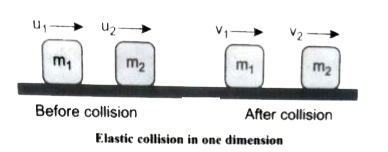What is elastic collision ? Derive an expression for final velocities of two bodies which undergo elastic in one dimension.Solution in Tamil
Elastic collision: In a collision, the total initial kinetic energy of the bodies (before collision) is not equal to the total final kinetic energy of the bodies (after collision) then, it is called as inelastic collision. i.e.,
Consider two elastic bodies of masses m, and m, moving in a straight line (along positive x direction) on a frictionless horizontal surface as shown in figure.

In order to have collision, we assume that the mass m1moves faster than mass m2i.e.,u1>u2. For elastic collision, the total linear momentum and kinetic energies of the two bodies before and after collision must remain the same.
From the law of conservation of linear momentum, Total momentum before collision (Pi) = Total momentum after collision (Pf)
m1u1+m2u2=m1v1+m2v1 ...(1)
m1(u1−v1)−m2(v2−u2) ......(2)
further
For elastic collision, Total kinetic energy before collision KEi = Total kinetic energy after collision KEf
12m1u21+12m2u22=12m1v21+12m2v22 ....(3)
After simplifying and rearranging the terms,
m1(u21−v21)=m2(v22−u22)
Using the formula a2−b2=(a+b)(a−b) , we can rewrite the above equation as
m1(u1+v1)(u1−v1)=m2(v1+u2)(v2−u2) ....(4)
Dividing equation (4) by (2) gives,
m1(u1+v1)(u1−v1)m1(u1−v1)=m2(v2+u2)(v2−u2)m2(v2−u2)
u1+v1=v2+u1
Rearranging u1−u2=v2−v1 .....(5)
Equation (5) can be rewritten as
u1−u2=−(v1−v2)
This means that for any elastic head on collision, the relative speed of the two elastic bodies after the collision has the same magnitude as before collision but in opposite direction. Further note that this result is independent of mass. Rewriting the above equation for v1 and v2
v1=v2+u2−u1 ....(6)
or v2=u1+v1−u1 .....(7)
To find the final velocities v1 and v2 :
Substituting equation (5) in equation (2) gives the velocity of m1 as
m1(u1−v1)=m2(u1+v1−u2−u2)
m1(u1−v1)=m2(u1+v1−2u2)
m1u1−m1v1=m2u1+m2v1+2m2u2
m1u1−m2u1+2m2u2=m1v1+m2v1
(m1−m2)u1+2m2u2=(m1+m2)v1
or v1=(m1−m2m1+m2)u1+(2m2m1+m2)u2
Similarly, by substituting (6) in equation (2) or substituting equation (8) in equation (7), we get the final velocity of m2 as
v2=(2m1m1+m2)u1+(m2−m1m1+m2)u2 .....(9)
Topper's Solved these Questions
- EXAMINATION QUESTION PAPER MARCH 2019BOOK - FULL MARKSCHAPTER - EXAMINATION QUESTION PAPER MARCH 2019EXERCISE - PART-III
9 Videos
- EXAMINATION QUESTION PAPER - JUNE 2019BOOK - FULL MARKSCHAPTER - EXAMINATION QUESTION PAPER - JUNE 2019EXERCISE - PART IV
10 Videos
- GRAVITATIONBOOK - FULL MARKSCHAPTER - GRAVITATIONEXERCISE - ADDITIONAL QUESTIONS SOLVED (Numerical Problems)
18 Videos
Similar Questions
What is the torque of the force →F=3ˆi−2ˆj+4ˆk acting at a point →r=2ˆi+3ˆj+5ˆk about the origin?
View SolutionExplain in detail the triangle law of addition.
View SolutionA geo-stationary satellite is orbiting the Earth of a height of 6R above the surface of Earth R being the radius of the Earth calculate the time period of another satellite at a height of 2.5R from the surface of Earth.
View SolutionDiscuss elastic collision in one dimension. Obtain expressions for velocities of the two bodies after such a collision.
View SolutionDerive velocities after the collision in terms of velocities before collision in elastic collision in one dimension case.
View SolutionObtain the expression for the velocities of the two bodies after collision in the case of one dimensional elastic collision ond discuss the specical cases.
View SolutionWhat is elastic collision ? Derive an expression for final velocities of two bodies which undergo elastic in one dimension.
View SolutionDerive final velocities V_1 and V_2 after perfectly elastic collision.
View SolutionWhat is elastic collision ? Derive an expression for final velocities of two bodies which undergo elastic in one dimension.
View SolutionWhat is meant by elastic collision ? Show that when two bodies of equal masses moving in one dimension suffer elastic collision, their velocities are exchanged after collision.
View SolutionArrive at an expression for elastic collision in Dimension and discuss various case.
View SolutionObtain the expression for the velocities of the two bodies after collision in the case of one dimensional elastic collision ond discuss the specical cases.
View SolutionWhat is elastic collision ? Derive an expression for final velocities of two bodies which undergo elastic in one dimension.
View SolutionCollision|Perfectly Elastic Collision In One Dimension
View SolutionObtain expression for velocities of the two bodies after elastic collision in one dimension .

View Solution
